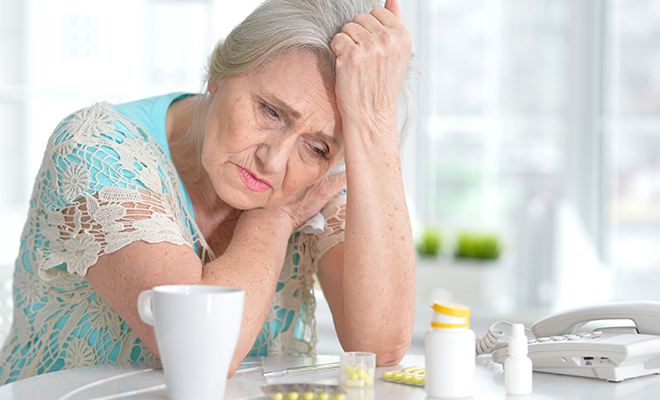
Aging and Addiction: Overcoming Dependency on Alcohol or Medications
Roughly 2.5 million older adults in the United States have an alcohol or drug problem; 6 to 11 percent of elderly hospital admissions are the result of alcohol or drug-related problems.
Even more shocking, nearly 50 percent of nursing home residents have alcohol-related problems and widowers older than age 75 have the highest rate of alcoholism in the country. On the pharmaceutical side, nearly 17 million prescriptions for tranquilizers are prescribed annually for older adults. In fact, prescription drug abuse is one of the most common problems in this segment of the population.
There are a variety of reasons elderly individuals may turn to the pill bottle or the wine bottle later in life. Perhaps they once enjoyed a full and vibrant life, but their kids grew up and left home, friends grew apart or passed away, physical health may be on the decline, or a partner of many years becomes ill or dies. Aging comes with its own unique set of difficulties and challenges that can easily add up to an overwhelming sense of depression and hopelessness. Additionally, a person may have battled addiction throughout his or her life and that problem has continued to get worse over the years.
Alcohol and drug abuse are harmful at any age, but at the advanced stages in life, the result is much more severe, as the impact of related injuries is greater and the risk of potentially deadly interactions between alcohol and medications increases. The physical effects of these substances on the individual are far more debilitating.
Drug and alcohol abuse among the elderly is often misdiagnosed, primarily because of limited or insufficient knowledge, limited research data and rushed office visits. Symptoms of abuse frequently mimic symptoms of other issues and illnesses, such as diabetes, dementia and depression. Sadly, the adult children of these older adults are often too ashamed of the problem and opt not to even address it, perhaps dismissing the notion altogether, as “Grandpa just loves his scotch,” or “She is old. Let her enjoy what little life she has left.” For some health care professionals, there is a lack of knowledge or understanding of this topic, coupled with a lack of training, and there’s a missed opportunity to combat the problem in a patient.
However, once a problem is identified, there are many treatment options available to counter the issue successfully. Older adults may not even be aware of the risk they are assuming, as they may be using these substances in a manner consistent with their younger days, not realizing the associated risks have increased. Addiction support groups for this population exist to help them builder a better life away from drugs and alcohol. Individual therapy is also an avenue of support. Addiction rehab is yet another option for seniors who continue to struggle with this problem. Appropriate treatment philosophies focus on clear, respectful, empathetic communication that takes into account the effects of aging and potential cognitive decline.
If you desire to support your loved one, learn all you can about substance abuse. Let that person know you are there for them, and realize recovery is an ongoing process. Helping a senior find the right treatment options is a vital role and one of the best ways through which you can show your support. Your elderly loved one stands a far greater chance of success achieving and maintaining sobriety with your continued support and encouragement. If you believe your loved one has a problem, the time to act is now. If necessary, you may also see the need to enlist a professional interventionist who is properly trained to handle the emotional aspects of the intervention. While it may take longer for an older adult to recover, his or her overall long-term recovery is far greater at this age than at any other age in life, as they usually tend to embrace their new-found sobriety with enthusiasm. ■
Sources: uphs.upenn.edu, ncadd.org and projectfind.org.
Signs of Dependency
The signs of drug dependency and alcoholism are different in the older generation. The abuse is often hidden, misdiagnosed or even completely overlooked. What are some of the red flags indicative of an older adult abusing drugs and/or alcohol? Consider these questions.
Is she drinking alone or secretively?
Is there a ritual of drinking before, with or after dinner?
Has he lost interest in activities that were once pleasurable?
Is she acting in a hostile or depressed manner?
Is there a noticeable loss of memory or an increase in confusion?
Does he drink despite warning labels to the contrary on prescription drugs?
Does she present with chronic or unsupported health complaints?
Have you noticed a decline in physical appearance?
Is speech slurred or do you smell alcohol on the breath?







